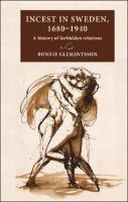Explore

"This study brings out the norms and culturally dependent values that formed the basis of the theoretical regulation and the practical handling of incest cases in Sweden 1680–1940, situating this development in a wider European context. It discusses a broad variety of general human subjects that are as important today as they were hundreds of years ago, such as love, death, family relations, religion, crimes, and punishments. By analysing criminal-case material and applications for dispensation, as well as political and legislative sources, the incest phenomenon is explored from different perspectives over a long time period. It turns out that although the incest debate has been dominated by religious, moral, and later medical beliefs, ideas about love, age, and family hierarchies often influenced the assessment of individual incest cases. These unspoken values could be decisive – sometimes life-determining – for the outcome of various incest cases. The book will interest scholars from several different fields of historical research, such as cultural history, the history of crime and of sexuality, family history, history of kinship, and historical marriage patterns. The long time period also broadens the number of potential readers. Since the subject concerns general human issues that are as current today as they were three centuries ago, the topic will also appeal to a non-academic audience. "
This book is included in DOAB.
Why read this book? Have your say.
You must be logged in to comment.
Editions

